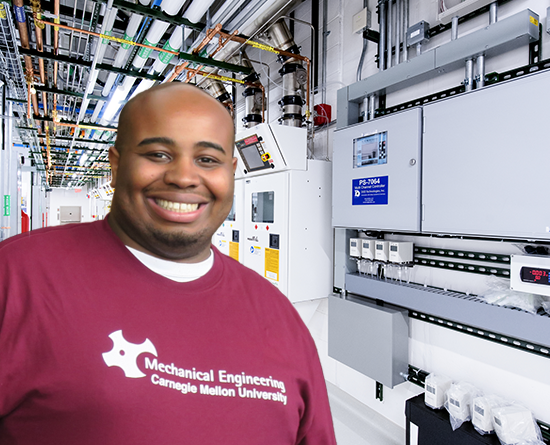Microscopic engineering, macroscopic value
Kayla Valentine
Jun 27, 2022

After earning an M.S. in Mechanical Engineering, Alex Kwakye joined Intel Corporation.
Process engineering, a hidden gem in mechanical engineering, involves designing, implementing, and optimizing the production process. For alumnus Alexander Kwakye ('18), production on a micro-scale emphasizes the importance of quality over quantity.
“At Intel, I manage our key metrics, such as output, defects, and quality. Quality is a big component of the job because we’re replicating this process 24/7, so we need to maintain the standard.”
Kwakye’s work in process engineering began during his time at Carnegie Mellon University, starting with his exposure to nanofabrication, which he explored in both his undergraduate and graduate studies. The industry fascinated Kwakye, who wanted to try something different from what mechanical engineers typically pursue.
In the Claire & John Bertucci Nanotechnology Laboratory at CMU, he was assigned the task of reducing stress placed on wafer–thin slices of semiconductor used when creating integrated circuits–processes. Kwakye worked with a Physical Vapor Deposition (PVD) machine to deposit small, thin amounts of metallics onto a wafer using plasma at a very low vacuum rate. He performed the measurement process, checking the thickness of the wafers. The goal was to streamline the service for other customers and researchers utilizing the lab.
Students need to have open expectations and a willingness to work with each other outside of their specific field.
Alex Kwakye, M.S. Mechanical Engineering, Carnegie Mellon University
“My work and apprenticeship with the NanoFab facility elevated my maturity and my exposure in the field, developing the foundation that I would need to succeed in areas such as metallics, and working with wet and dry etching.” Kwakye has continued working with wet and dry etching, processes used during the microfabricating of circuit boards, in his career with Intel.
When asked what advice he would give to current and incoming CMU students alike, Kwakye emphasized the importance of collaboration and utilization of resources.
“When I look back at my graduate research project, which involved working with a lot of individuals who were in the biomed field, such as professors at the University of Pittsburgh and CMU, I find that I loved the interweaving effect of what I was doing and expanding what I thought my research could achieve,” he said.
“Students need to have open expectations and a willingness to work with each other outside of their specific field,” said Kwakye, “I think we take that for granted; when you arrive at school, you’re dead-set on one thing, and you don’t tend to see the fruition of other opportunities that could also assist in your endeavors.”
Kwakye graduated from CMU in 2018 with a master’s of science degree in mechanical engineering. He joined Intel Corporation as a dry etch process engineer in 2018.
Media contact:
Lisa Kulick, lkulick@andrew.cmu.edu